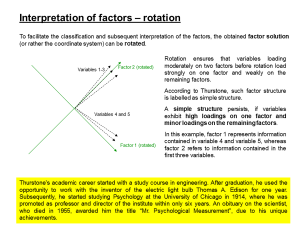Getting distracted by irrelevant information and thus being interrupted in an ongoing task is an omnipresent situation in daily life. In particular in applied settings, a variety of interfering factors occupies the limited cognitive resources. My existing research focuses on related effects in multimedia learning and mobile interaction contexts and employs both experimental research and computational cognitive modeling. Current work turns these insights into a training approach that can strengthen attention control skills in everyday life. In addition, we explore trait-level tendencies in mind-wandering and shed light on individual differences in resumption strategies.
Individual differences in resumption strategies (2022 – 2024)
In our everyday life, interruptions are pervasive and often difficult to avoid. This can be particularly disruptive for learning, which requires sustained and selective attention. For this reason, an effective recovery from interruptions might be crucial to attenuate their negative effects on learning outcomes. Individual differences in resumption have been related to differences in working memory capacity, cognitive workload, and strategy consistency. However, what other factors can influence resumption strategies in learning contexts? How are these strategies characterized? Are there specific task-characteristics that can aid resumption? A PhD project affiliated with the IMPRS-IS addressed these questions and further investigated individual differences in interruption recovery through the analysis of eye movements. The resulting evidence has important implications for further understanding the cognitive process of recovery from interruptions, for instructional design, and for the development of adaptive systems that can support this process.
Trait-level tendencies in mind-wandering (2021 – 2022)
Mind wandering is defined as a shift of attention to task-unrelated internal thoughts that is pervasive and disruptive for learning performance. Current state-of-the-art gaze-based attention-aware intelligent systems are already capable of detecting mind wandering from eye movements and delivering interventions to mitigate its negative effects. However, the beneficial functions of mind wandering and its trait-level tendencies such as prospective planning or creative problem-solving are still largely neglected by these systems. In collaboration with the Perceptual User Interfaces group, we explore whether different mind wandering trait-level tendencies can be detected through different gaze parameters, which paves the way for more advanced adaptive educational technologies.
Attention control training “in the wild” (2018 – present)
Strong attention control skills can prevent harmful effects of distraction. To foster these skills, a joint project with colleagues at the Max Planck Institute for Intelligent Systems resulted in a computer-based training app. This app provides metacognitive feedback on the value of exerting attention control when people distract themselves from a self-chosen task. Contrary to existing approaches, it turns daily life settings into a gym for the mind to achieve stable and sustainable skill acquisition. We evaluate the training in different settings (e.g., school, university, workplace), where participants use the app over a defined period of time during work or study activities. From the obtained data, we can develop cognitive models that predict the development of attention control skills.
The presented research was conducted collaboratively with the Software Workshop and the Rationality Enhancement Group at the Max Planck Institute for Intelligent Systems in Tübingen, Germany, with kind support from the Cyber Valley Research Fund.

Can hyperlinks interrupt schema acquisition? (2016 – 2021)
Hyperlinks became indispensable in our digital age and are an inherent feature of many computer-based learning environments. On the positive side, they can foster deeper understanding, but on the negative side they might also impair the construction of coherent mental models. To explore this duality further, we investigated selected hyperlink features with interrupting potential. In more detail, we manipulated link loading times, spatial link format and fit between link and learning page contents in two learning tasks on (1) metabolism and energy generation and (2) the operation of a Stirling engine. Even if we could not observe crucial impairments in performance, the inspected features required increased cognitive resources to compensate for the related demands. We can take this as promising hint to further explore these features in different settings.

Interruption and resumption in a Smartphone task (2013 – 2014)
In a second project, I used a shopping list application to investigate cognitive processes related to interruption and resumption in a real-world scenario. Interruptions occurred due to product advertisement, and task difficulty was increased when shopping had to be done for more than one person. On methodological accounts, I used the cognitive architecture ACT-R to develop a computational model of underlying cognition and validated the emerging pattern with human experimental data. In particular the final product recall indicated a good fit between model and human data. Future directions involve the exploration of beneficial resumption strategies for different user groups and situations to incorporate them in assistive systems.

Attention distraction in multimedia learning (2012)
A first project in this area of research focused on constraints arising from impaired attention in multimedia learning settings. In a task on factor analysis, attention impairments were included by distracting system-notifications, e.g., update messages, and interesting but irrelevant (so-called “seductive”) text passages that are used to foster motivation. Both features have a high prevalence in computer-based learning environment. To assess learners’ individual level of attention control, I used the FAIR-2, a standardized psychological attention inventory. The results showed that irrelevant information extended the learning time. Furthermore, learners with higher levels of attention control could cope better with system-notifications and achieve increased learning performance.
Related publications
- Zermiani, F., Dhar, P., Sood, E., Kögel, F., Bulling, A., & Wirzberger, M. (2024). InteRead: An eye tracking dataset of interrupted reading. In LREC-COLING 2024 – The 2024 Joint International Conference on Computational Linguistics, Language Resources and Evaluation[PDF]
- *Wirzberger, M., *Lado, A., Prentice, M., Oreshnikov, I., Passy, J.-C., Stock, A., & Lieder, F. (2024). Optimal feedback improves behavioral focus during self-regulated computer-based work. Scientific Reports, 14, 3124. https://doi.org/10.1038/s41598-024-53388-3 *Authors share first authorship
- Herbst, V., Stock, A., Bareiß, L., & Wirzberger, M. (2023). User’s acceptance of an AI-based software to promote attention control. In M. Goldwater, F. K. Anggoro, B. K. Hayes, & D. C. Ong (Eds.), Proceedings of the 45th Annual Meeting of the Cognitive Science Society (p. 3911). Cognitive Science Society. [ABSTRACT] [POSTER]
- Wirzberger, M., Lado, A., Scheiger, C., Stock, A., & Zermiani, F. (2022). Augmented learning contexts: Leveraging augmented technologies to foster self-regulation in everyday life. In 52nd Bi-annual Congress of the German Psychological Society.
- Zermiani, F., Bulling, A., & Wirzberger, M. (2022). Mind wandering trait-level tendencies during lecture viewing: A pilot study. In 2022 Symposium on Eye Tracking Research and Applications (ETRA ’22), June 8–11, 2022, Seattle, WA, USA. New York, NY, USA: ACM. https://doi.org/10.1145/3517031.3529241 [ARTICLE]
- Wirzberger, M., & Schwarz, M. (2021). Förderung selbstregulierten Lernens durch ein KI-gestütztes Training [Promoting self-regulated learning with an AI-based training]. Bildung und Erziehung, 74, 280–295. [SUMMARY]
- Wirzberger, M. (2021). ACTrain@School: Can we bring AI to the classroom to foster self-regulated learning?. In EARLI 2021 – Online. [PDF]
- Wirzberger, M., Lado, A., Eckerstorfer, L., Oreshnikov, I., Passy, J.-C., Stock, A., Shenhav, A., & Lieder, F. (2020). How to navigate everyday distractions: Leveraging optimal feedback to train attention control. In 42nd Annual Meeting of the Cognitive Science Society. [ABSTRACT] [POSTER]
- Wirzberger, M., Oreshnikov, I., Passy, J.-C., Lado, A., Shenhav, A., & Lieder, F. (2020). ACTrain: Ein KI-basiertes Aufmerksamkeitstraining für die Wissensarbeit [ACTrain: An AI-based attention training for knowledge work]. In 66th Spring Conference of the German Ergonomics Society. [PDF]
- Wirzberger, M., & Rey, G. D. (2018). Attention please! Enhanced attention control abilities compensate for instructional impairments in multimedia learning. Journal of Computers in Education, 5, 243-257. https://doi.org/10.1007/s40692-018-0106-0
- Wirzberger, M., Schneider, S., Dlouhy, S., & Rey, G. D. (2017). Time – Space – Content? Interrupting features of hyperlinks in multimedia learning. In T. Goschke, A. Bolte, & C. Kirschbaum (Eds.), Abstracts of the 59th Conference of Experimental Psychologists (TeaP) (p. 97). Lengerich: Papst Science Publishers.
- Wirzberger, M., & Russwinkel, N. (2015). Modeling interruption and resumption in a smartphone task: An ACT-R approach. i-com, 14, 147-154. https://doi.org/10.1515/icom-2015-0033
- Wirzberger, M. (2014). Smart@load? Modeling interruption while using a Smartphone-app in alternating workload conditions (Master thesis, TU Berlin). [PDF]
- Russwinkel, N., Prezenski, S., Lindner, S., Halbrügge, M., Schulz, M., & Wirzberger, M. (2014). Modeling of cognitive aspects of mobile interaction. Cognitive Processing, 15(Suppl. 1), S22-S24. https://doi.org/10.1007/s10339-014-0632-2
- Wirzberger, M., & Russwinkel, N. (2014). „I don’t need it“ – Modeling ad-induced interruption while using a smartphone-app. In Crosswolds 2014: Theory, Development and Evaluation of Social Technology, Chemnitz. https://doi.org/10.13140/RG.2.1.4426.0966
- Wirzberger, M., & Rey, G. D. (2013). Attention impairment in multimedia learning: Does initial task attention act as moderator?. In F. Schwab, A. Carolus, M. Brill, & C. Hennighausen (Eds.), Media Psychology: Media Research: Yesterday, Today, and Tomorrow. Proceedings of the 8th Conference of the Media Psychology Division of the German Psychological Society (p. 11), Würzburg: University of Würzburg.
- Wirzberger, M., & Rey, G. D. (2013). Inducing impaired attention within the seductive detail effect: Do already distracted learners suffer more?. In U. Ansorge, E. Kirchler, C. Lamm, & H. Leder (Eds.), Abstracts of the 55th Conference of Experimental Psychologists (p. 314), Lengerich: Pabst Science Publishers.
- Wirzberger, M. (2012). Experimentelle Induktion beeinträchtigter Aufmerksamkeit im Kontext des seductive detail Effekts [Experimental induction of attention distraction within the seductive detail effect] (Bachelor thesis, University of Hagen). [PDF]
